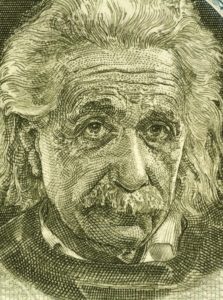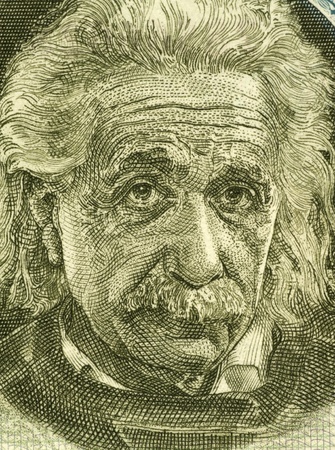
Albert Einstein had one of the most original scientific minds in human history. Curiously, one his most famous quotes was, “God does not play dice.” This had led some to glibly assert: “He believed in God.” For example, in 2015 an auction-house in California put up 27 letters written by Einstein for auction claiming they revealed the personal side of his story—“how he advised his children, how he believed in God.” The founder of the auction house said the letters were on sale from $5,000 to $40,000 each. He thought the total take could be between $500,000 and $1 million. But exactly what did Einstein believe about God?
A brief article that appeared in The Washington Times, “Albert Einstein was no atheist, said the 27 letters up for auction showed ‘he believed in God.’” Hermant Mehta noted how this was a classic example of taking something out of context. In “Did Albert Einstein Believe in God or Not?” Mehta said that if Einstein had been alive today, he would likely seek to avoid religious labels. While he would reject being called a New Atheist, he wouldn’t spend time praying or thinking about God. Einstein didn’t believe in a personal God.
Einstein’s religion, if you have to put a label to it, is a sort of nebulous Deism: Maybe God played in role in creating the universe — because nature inspires such awe and the universe seems perfectly guided by mathematics — but that God has no direct affect on our lives today.
In The Ultimate Quotable Einstein by Alice Calaprice, Einstein said he could not conceive of a personal God “who would directly influence the actions of individuals.” Rather, he believed in Spinoza’s God, “Who reveals Himself in the lawful harmony of the world, not in a God who concerns himself with the fate and the doings of mankind.” His understanding of God came from “from the deeply felt conviction of a superior intelligence that reveals itself in the knowable world.”
He said he often read the Bible, but its original text was beyond his reach. He wanted to know how God created this world. His religiosity consisted in “a humble admiration of the infinitely superior spirit that reveal itself in the little that we can comprehend of the knowable world.” The deeply emotional conviction of the “presence of a superior reasoning power, which is revealed in the incomprehensible universe, forms my idea of God.”
Try and penetrate with our limited means the secrets of nature and you will find that, behind all the discernable concatenations, there remains something subtle, intangible, and inexplicable. Veneration for this force beyond anything that we can comprehend is my religion. To that extent I am, in point of fact, religious.
It was this sense of God and religion that Einstein brought to his understanding of the relationship between religion and science. And we get a clearer picture of that understanding in these three articles written by him: “Religion and Science,” “Science and Religion,” and “Religion and Science: Irreconcilable?” All three are available here. See the link for information on where they were originally given or published.
In “Religion and Science,” originally published in 1930, Einstein described three stages to religious thought and belief. The initial, almost animistic stage was a religion of fear. “At this stage of existence understanding of causal connections is usually poorly developed, the human mind creates illusory beings more or less analogous to itself on whose wills and actions these fearful happenings depend.” Securing favor from these beings was by actions and sacrifices, which led to the emergence of a priestly caste as a mediator between the people “and the being they fear.”
The second stage was one of moral religion, where social impulses crystallized another type. This was “the God of Providence, who protects, disposes, rewards and punishes.” This god loved and cherished the life of the tribe or the human race; or even life itself. He comforted in sorrow and unsatisfied longing; he preserved the souls of the dead. Einstein commented how the Jewish scriptures illustrated the development from the religion of fear to moral religion, which continued into the New Testament.
“The religions of all civilized peoples, especially the peoples of the Orient, are primarily moral religions.” Although the development from a religion of fear to moral religion is a great step, Einstein urged caution. “The truth is that all religions are a varying blend of both types, with this differentiation: that on the higher levels of social life the religion of morality predominates.” A common factor in all these types is “the anthropomorphic character of god corresponding to it.”
The individual feels the futility of human desires and aims and the sublimity and marvelous order, which reveal themselves both in nature and in the world of thought. Individual existence impresses him as a sort of prison and he wants to experience the universe as a single significant whole. The beginnings of cosmic religious feeling already appear at an early stage of development, e.g., in many of the Psalms of David and in some of the Prophets. Buddhism, as we have learned especially from the wonderful writings of Schopenhauer, contains a much stronger element of this.
Religious geniuses of all ages are known by this kind of religious feeling. It has no dogma and no God conceived in man’s image. “There can be no church whose central teachings are based on it.” Both heretics and saints of every age were “filled with this highest kind of religious feeling.” Without dogma or a church, this “cosmic religious feeling” is communicated from one person to another by art and science. “In my view, it is the most important function of art and science to awaken this feeling and keep it alive in those who are receptive to it.”
Seeing science and religion as irreconcilable antagonists is thus easy to see with this sense of religion and science, according to Einstein. The individual who takes the hypothesis of causality seriously, who is convinced of the universal operation of the law of causation, cannot entertain “the idea of a being who interferes in the course of events.” There is no room “for the religion of fear and equally little for social or moral religion.”
A God who rewards and punishes is inconceivable to him for the simple reason that a man’s actions are determined by necessity, external and internal, so that in God’s eyes he cannot be responsible, any more than an inanimate object is responsible for the motions it undergoes. Science has therefore been charged with undermining morality, but the charge is unjust. A man’s ethical behavior should be based effectually on sympathy, education, and social ties and needs; no religious basis is necessary. Man would indeed be in a poor way if he had to be restrained by fear of punishment and hopes of reward after death.
This mysterious “cosmic religious feeling” is completely separate from science, according to Einstein. And it is within this sense of religion and science that we can understand another quote of his found in Part II of his second article, “Science and Religion”:
For science can only ascertain what is, but not what should be, and outside of its domain value judgments of all kinds remain necessary. Religion, on the other hand, deals only with evaluations of human thought and action: it cannot justifiably speak of facts and relationships between facts. According to this interpretation the well-known conflicts between religion and science in the past must all be ascribed to a misapprehension of the situation, which has been described.
The conflict between science and religion stems from the religious concept of a personal God. “The main source of the present-day conflicts between the spheres of religion and of science lies in this concept of a personal God.”
The aim of science is “to establish general rules which determine the reciprocal connection of objects and events in time and space.” These rules or “laws of nature” require general validity; they are not proven to be so. The more a person is “imbued with the ordered regularity of all events,” the firmer becomes their conviction that there is no room left for causes other than this ordered regularity. Personal or divine will does not exist as an independent cause of natural events.
To be sure, the doctrine of a personal God interfering with natural events could never be refuted, in the real sense, by science, for this doctrine can always take refuge in those domains in which scientific knowledge has not yet been able to set foot.
The god of Einstein is not the God of Scripture. That God is clearly portrayed as a personal God, which Einstein consistently and repeatedly rejected. He did acknowledge the independence of science and religion, as well as the limits of what can be known through science. But his understanding of “God” fails to affirm the crucial Creator-creature distinction inherent in Christianity. His god is part of nature; it is more pantheistic than it is theistic. It has more in common with Ludwig Feuerbach, who believed that man’s God was man, “homo homini Deus est.”
Christian theology would see Einstein as deifying nature. Romans chapter one noted that the invisible attributes of the personal Creator God are clearly seen in the things that were made. Instead of knowing and honoring God, he affirmed the existence of a superior intelligence revealed in the knowable world. This “god” could be experienced through a mysterious “cosmic religious feeling.” There is no room for divine or personal will independent of the ordered regularity of natural events. Paul would say Einstein exchanged the truth of God for a lie (Romans 1:18-23).
So what about Einstein’s quote about God not playing dice? Another famous physicist, Stephen Hawking (among others) observed in “Does God Play Dice?” that Einstein was unhappy about the apparent randomness in nature, which he succinctly stated in his famous phrase of God not playing dice. Einstein thought the uncertainty in nature was only provisional. There had to be an underlying reality, where particles had well defined positions and speeds, and would adhere to deterministic laws. “This reality might be known to God, but the quantum theory of light would prevent us from seeing it.”
Hawking then noted Einstein’s view would today be called a hidden variable theory. “But these hidden variable theories are wrong.” A British physicist named John Bell devised an experimental test that would distinguish hidden variable theories. But when it was carefully carried out, the results were inconsistent with hidden variables. Hawking remarked that it seems even God is bound by the Uncertainty Principle. “So God does play dice with the universe.”





